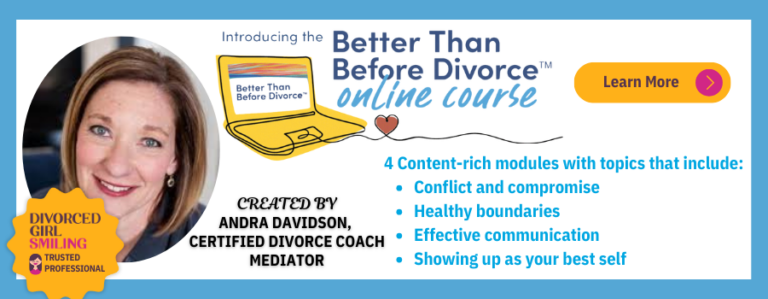Picture a toddler mid-meltdown, and then try to figure out why it’s happening. Is it the parent’s fault? Is the mom a bad mother? Of course not. Maybe their parent said no to a snack or asked them to put on shoes, but we all know it’s rarely just about that moment. They’re probably tired, hungry, overstimulated, or all the above. It’s obvious the outburst isn’t really about the shoes. That’s why in divorce, so many times, it’s not about you.
During divorce, when emotions are already raw and everything feels personal, it’s so easy to think: What did I do? Did I say the wrong thing? Was I too much – or not enough? Then comes the spiral. The mental replay, the self-doubt, the inner critic that insists if we had only acted differently, maybe things wouldn’t have gone this way. It’s a painful trap. And one many of us fall into.
Even when we know better, even when we know people’s reactions are shaped by a thousand invisible threads – from childhood wounds to current stressors – it’s still easy to blame ourselves, especially when the stakes feel high, like they often do in relationships, breakups, and co-parenting dynamics.
If you’re in the thick of a divorce, you might find yourself asking:
Was there something I could’ve done to make them stay?
Did I cause the distance?
What if I had just been more patient? More fun? More…whatever?
Let me be clear: honest self-reflection matters. Taking ownership of your patterns and behaviors is where real growth lives. It’s brave and powerful work. But so is letting go of the things that were never yours to carry, and remembering so often, it’s not about you.
Sometimes, your ex’s behavior had absolutely nothing to do with you. Sometimes, their choices came from their own pain, identity crises, or life transitions, some of which they may not even fully understand themselves. Careers change. Kids grow up. People feel stuck, lost, or unseen. And while you may have shared a life, you’re not responsible for the emotional weight they chose not to unpack.
We crave black-and-white answers in the aftermath of heartbreak. But most of the time, the truth lives in the gray. I often return to The Four Agreements by Don Miguel Ruiz, especially the second one: Don’t Take Anything Personally. One of my favorite passages from the book is this:
“If someone is not treating you with love and respect, it is a gift they walk away from you… Walking away may hurt for a while, but your heart will eventually heal. Then you can choose what you really want.”
It echoes the message behind Mel Robbins’ new mantra, now viral for a reason: Let Them. Let them ignore you. Let them pull away. Let them make the choice you never thought they would. Because trying to control someone else’s behavior (or fix their wounds) is a guaranteed path to suffering.
Letting go of that need—letting them—is a radical act of self-trust.
As Robbins puts it:
“By chasing love, you chase away the deep and meaningful relationship you’re worthy of.”
So next time someone reacts in a way that stings or confuses you – pause. Breathe. Ask yourself: Is this about me, or might this be about them? Then remember: You get to decide what you hold onto. You get to decide who you chase. And you get to trust in yourself to build the next chapter of your life.
Like so many of you, I’ve walked that road. From heartbreak to healing. From fear to freedom.
And I’ve become stronger, clearer, and my life is better than I ever imagined it could be. You’ll get there, too. And when you do, I hope you’re no longer twisting yourself to fit someone else’s story. Why? Because it’s not about you. I hope you’re writing your own story, because you absolutely deserve a future you love.
Like this article? Check out “What is a Personal Mission Statement and Why Do You Need One During Divorce?”





















